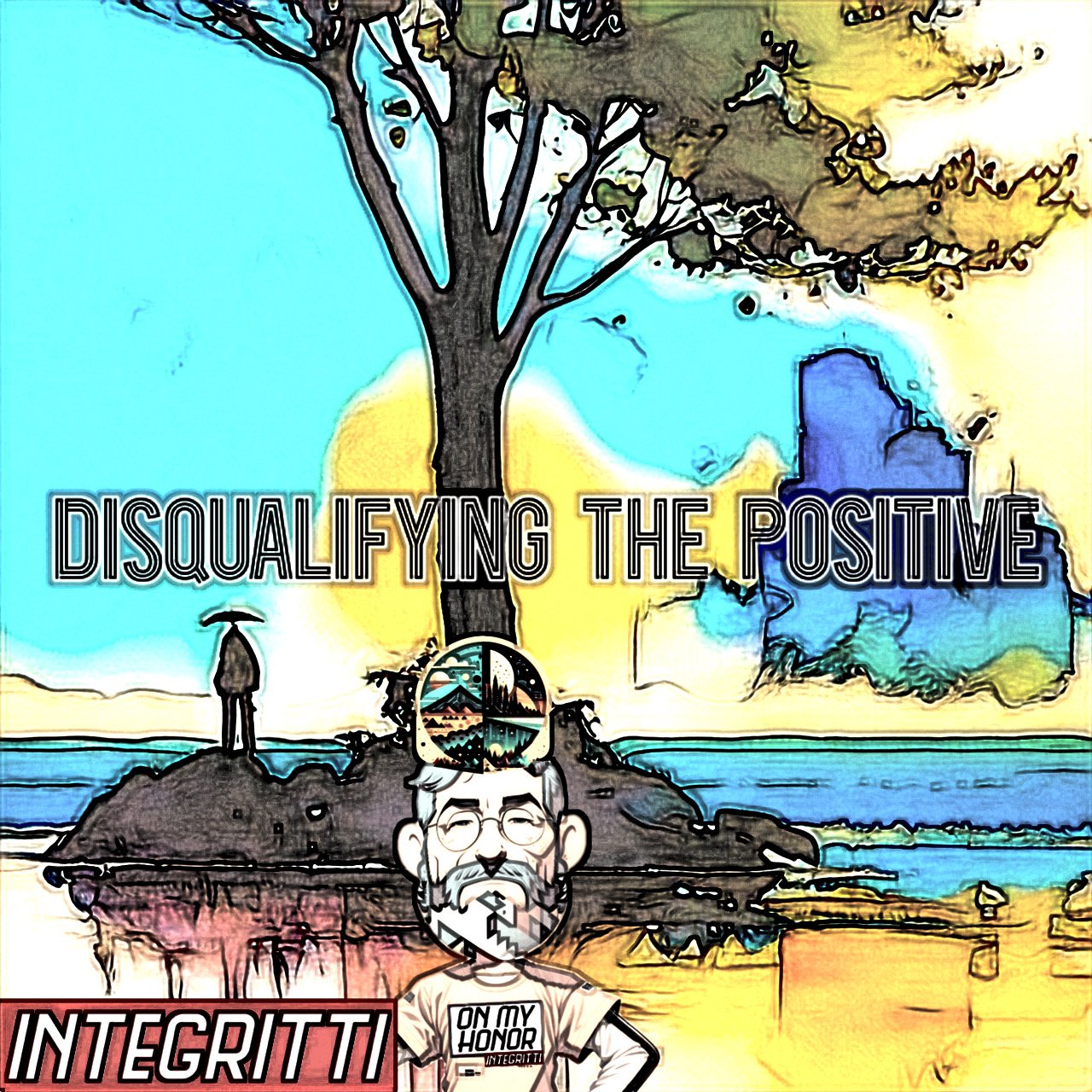
Welcome to my blog. If you like what you find here I’d love to know. As Ram Dass liked to say, “My ego needs a lot of encouragement.” Stay Mindful
Disqualifying the Positive
Disqualifying the positive is a particularly subversive cognitive distortion. It’s a mindset that changes a positive event into a neutral or negative event. Leading one to reject positive experiences by insisting they “don’t count“ for some reason or another.
Processing any information in a biased way is cognitive dissonance. Meaning you choose to be bias against as opposed to except the situation. By disqualifying the positive they choose to only believe the negative aspects as relevant. It is not “all or nothing” thinking, but instead “it was nothing” thinking.
The quickest way I have found to spot this distortion is to notice that guilt is resting in the place where pride should be for a healthy mind body balance.
There is of course the counter part that is disqualifying the negative and it is a cognitive distortion for pretty much the same reason. The logic is based on a bias instead of objective observation.
Disqualifying the positive is an example of believing we can remake reality without realizing it is our subjective perception that is reframing something in a way that is unhealthy to us.
Stay Mindful
Gritti
Mental filter
When thinking through a mental filter, a person is focusing only on a single aspect of a situation, and filtering out everything else. And this way, they completely ignore everything that disagrees with that detail. Mental filtering plays a big part when it comes to how we judge experiences, which magnify the aspects of past experiences, and then ultimately trigger an automatic response for future events.
by picking out a single negative or positive detail, and focusing on only that, you convince yourself that the whole situation is positive or negative. A person who is overly optimistic, is using a mental filter, and the same is true for an overly pessimistic person.
Both positive and negative filters can lead someone to act irrationally. Remember, mental filtering, like all cognitive distortions, clouds our ability to see situations clearly.
“ it’s not what happens to you, but how you react to it that matters.”
-Epictetus- stoic philosopher.
Stay Mindful
Gritti
Overgeneralizing
Overgeneralizing is the process of extending the characteristics of a number of elements from a group, in a way that is not reasonable.
Or more simply put, it is generalizing too much. The overgeneralizing mentality generally comes from using past experiences to give you the faith that the future will follow a certain pattern. Quite often that pattern leads to an undesired future.
A couple of examples
It hasn’t worked in the past, so it’s not going to in the future.
Those types of people will never learn to change.
Someone who overgeneralizes lives in a world of categories and stereotypes. They tend to lump other people into types, and then assume they understand them because of past experience with said types. Which just allows them to reaffirm their cognitive bias.
Phrases like “all ___ are bad“, or “everything I do fails“ get stuck on repeat in their minds, which intern negatively impacts their motivation and drive.
It is so important to remind ourselves that perspective is subjective. Anytime we find ourselves in a situation that causes us to overgeneralize, we need to remember that the situation looks different to different people. Yours is not the only way to see things.
Generalizing is understandable, and even wise at times, but overgeneralizing more often than not limits our view. There are exceptions for almost everything. Details are important.
Tip to avoid overgeneralizing
Search through the thoughts and ideas you hold that are generic or very broad. Do you have any sweeping generalizations that you say often? Are there any examples of exceptions to those generalizations? If the answer is yes, then you may be overgeneralizing.
Stay Mindful
Gritti
All or nothing
All or Nothing
An absolute snake eating its absolute tail.
All or nothing thinking, polarized, thinking, or as it’s commonly called black-and-white thinking, is a cognitive distortion common among humans. This all or nothing mentality or mindset can be a huge obstacle to overcome. However, overcome it, we must if we are to see the multitude of possibilities that genuinely exist in contrast to this, or that, binary thinking.
Cognitive distortions are errors in thinking, and this particular error in thinking, is favored by people we might label as perfectionists. I would argue that what we call perfectionists are simply a combination of cognitive distortions, and “All or Nothing” thinking is just one of many in the equation, but this is just a theory.
Phrases like “I’m not good enough” or “I’ll never get it right” are born from this binary way of thinking. Never is a permanent negative, and absolute. “Never say never” is a phrase that opens the door to a rabbit hole. A place you’ll find yourself spiraling between two extremes often right or wrong, or who is to blame.
It is an all or nothing thinking mindset that says someone else is fully responsible or at fault.
Shifting perspective is the secret door out of all or nothing thinking. Though, if we’re being honest, it’s not such a secret door.
Perfectionism leads to unrealistic expectations. Perfectionism leads to unhealthy expectations. There is a world of difference between pushing yourself, and punishing yourself.
Tips on overcoming all or nothing thinking.
Create effort based goals
Effort based goals are amazing because you’re not competing with skill but with effort. Effort goals are largely under one’s control regardless of the competition. Aim your perfectionism at your effort. Life is about the journey not the destination. Life happens on the road not at the end of it.
Reevaluate your expectations
give yourself a break, and a chance to really excel at something by lowering your expectations a little.
An example of using both:
If you want to write a book, but feel like it’s impossible for you to write the book perfectly, then commit to writing a little every day at the same time. commit to showing up and before you know it you’ll have a rough draft to edit.
There are quite often other options to discover, and I believe it’s important to be mindful of that.
Stay Mindful
Gritti




